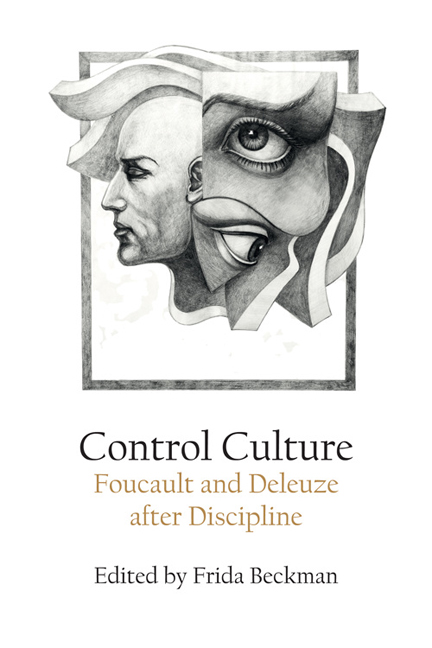Book contents
- Frontmatter
- Contents
- Acknowledgements
- Notes on Contributors
- Introduction. Control of What?
- 1 Notes from an Investigation of ‘Control Society’
- 2 Post-Mortem on Race and Control
- 3 Periodising (with) Control
- 4 Subjects of Sovereign Control and the Art of Critique in the Early Modern Period
- 5 Posthumanism, Social Complexity and the Political: A Genealogy for Foucault’s The Birth of Biopolitics
- 6 ‘That Path is for Your Steps Alone’: Popular Music, Neoliberalism and Biopolitics
- 7 Cinema in the Age of Control
- 8 Towards a ‘Minor’ Fascism: Panoptic Control and Resistant Multiplicity in TV’s Spooks
- 9 Species States: Animal Control in Phil Klay’s ‘Redeployment’
- 10 Control and a Minor Literature
- 11 Philosophy and Control
- Index
7 - Cinema in the Age of Control
Published online by Cambridge University Press: 05 May 2021
- Frontmatter
- Contents
- Acknowledgements
- Notes on Contributors
- Introduction. Control of What?
- 1 Notes from an Investigation of ‘Control Society’
- 2 Post-Mortem on Race and Control
- 3 Periodising (with) Control
- 4 Subjects of Sovereign Control and the Art of Critique in the Early Modern Period
- 5 Posthumanism, Social Complexity and the Political: A Genealogy for Foucault’s The Birth of Biopolitics
- 6 ‘That Path is for Your Steps Alone’: Popular Music, Neoliberalism and Biopolitics
- 7 Cinema in the Age of Control
- 8 Towards a ‘Minor’ Fascism: Panoptic Control and Resistant Multiplicity in TV’s Spooks
- 9 Species States: Animal Control in Phil Klay’s ‘Redeployment’
- 10 Control and a Minor Literature
- 11 Philosophy and Control
- Index
Summary
THETABLEOFINFORMATIONANDTHESOCIETYOFCONTROL
On the face of it, the coupling of cinema and ‘control society’ is bound to seem awkward, perhaps even counterintuitive. Neither term is particularly easy to define, but their combination seems to fly in the face of manifest associations on both sides. Whereas the etymological and technical origins of cinema belong to an older pictorial, physiological and photomechanical history, control is inconceivable apart from the invention of a new generation of digital machines. In his ‘Postscript on Control Society’ (1990), the short essay which effectively launched the eponymous concept, Gilles Deleuze insists that ‘information technology and computers’ underwrite the emergence of our postdisciplinary regime of power (Deleuze 1995: 180). Thus, ‘control’ describes a political economy, a biopolitics and an episteme – with the under-standing that the digital revolution transforms these categories in turn.
By these standards, cinema seems an anachronism. Media studies scholars have long argued that the so-called Seventh Art, often cast as the great mass medium of the twentieth century, actually culminates a technological lineage firmly entrenched in the opto-photo-mechanical tradition of the nineteenth century. If anything, then, cinema demonstrates a tenacious capacity to adapt to the new era of electricity (by automating the camera, projector and even editing table, no less by embracing artificial light and the introduction of synchronised sound). For scholars like Friedrich Kittler, the wonder is that the cinema persists as long as it has, even surviving the challenge posed by the introduction of television, the electronic medium par excellence. The same cannot be said with respect to the digital age. Over the past twenty-five years, audio-visual ‘entertainment’ has been so profoundly – we might even say, existentially – transformed by new media and digital communications as to outstrip the material origins of ‘film’ (the celluloid or cellulous acetate film strip) and ‘cinema’ (the cinematographic machine). When we go to the movies, the film itself is increasingly shot digitally, quite possibly distributed digitally, and in all likelihood projected digitally. Moreover, the viewing experience itself is no longer reducible to the model of the movie-goer: we watch on televisions, PCs, tablets, phones, watches; we gaze at screens on refrigerators and gas pumps, in waiting rooms and aeroplanes. Finally, as if anyone need be told, the ostensible differences between cinema, television, and online entertainment are swiftly dissolving.
- Type
- Chapter
- Information
- Control CultureFoucault and Deleuze after Discipline, pp. 121 - 140Publisher: Edinburgh University PressPrint publication year: 2018



